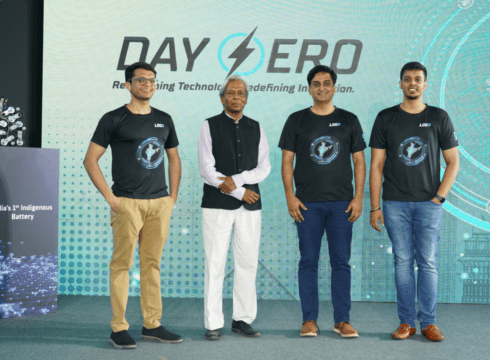Log9 Materials depends on engineers from China to set up imported machinery and upgrade existing ones at its manufacturing facility
The visa process for the Chinese experts has been delayed amid the ongoing border tensions between India and China
Pankaj Sharma, the cofounder of battery and cell manufacturer, said delay in granting visas will not only impact Log9 but the entire cell manufacturing sector
Inc42 Daily Brief
Stay Ahead With Daily News & Analysis on India’s Tech & Startup Economy
Lithium-ion (Li-ion) battery and cell manufacturer Log9 Materials’ production at its Bengaluru unit may take a hit due to the late arrival of Chinese experts in India on account of delays in their visa process.
Speaking to Inc42, Log9 cofounder and director Pankaj Sharma said that India doesn’t manufacture any of the equipment needed for building cells. Most of these are developed in some European countries, China, and South Korea. Hinting at the lower price for the Chinese equipment, he said the country is the go-to place for Indian cell manufacturers.
“The equipment need upgradation, changes in software parameters, customisation of the software, and more such maintenance. For these, the developers of these machines need to work with engineers here to help them set those up,” he said.
“However, these Chinese engineers are not able to come to India because the government is not processing their visas at all,” Sharma said, adding delay in granting visas will not only impact Log9 but the entire cell manufacturing sector.
Last month, a few other reports documented how the strict approval process for granting visas to Chinese nationals was hurting Indian businesses. In fact, the India expansion plans of some Chinese tech players have also been impacted by the same.
Reuters was the first to report on the developments around Log9. As per the news agency’s report, an Indian government official said earlier this month that some domestic manufacturers who rely on Chinese expertise have sought faster approval for visa applications of their vendors from China.
The development comes at a time when the relations between the two countries have taken a hit due to the ongoing border stand-off. Amid this, India has also increased the scrutiny of Chinese investments in the country.
Besides, the Indian government has also taken various measures to boost investment and manufacturing in the country to reduce dependence on China for raw materials and finished goods and establish the nation as a major manufacturing hub in the world.
The Indian government came out with a Production Linked Incentives (PLI) scheme for domestic manufacturing of advanced chemistry cells (ACC) in order to achieve a manufacturing capacity of 50 Giga GWh. It set a budgetary outlay of INR 18,100 Cr for the same.
In March this year, Ola Electric, Rajesh Exports, Hyundai Global Motors Company, and others won the bid for the PLI scheme. The Bhavish Aggarwal-led EV player is setting up facilities and is in talks with global suppliers for cell manufacturing.
“By blocking Chinese engineers, we are not serving the purpose, which is to make India Atmanirbhar. The root to Indianisation is to start to build with what is available from China, bring it to India, start building it, and then acquire that indigenised capability where a few years down the line we wouldn’t need any help from China,” Sharma added.
On the other hand, Log9 is one of the pioneering Li-ion cell manufacturers in India – a fast-growing electric vehicle (EV) market that heavily depends on China for Li-ion cells and batteries.
Log9, founded in 2015 by Dr. Akshay Singhal, Kartik Hajela and Pankaj Sharma, launched the country’s first commercial Li-ion cell manufacturing facility at its campus in Bengaluru in April this year. Its commercial Li-ion cell manufacturing line has an initial capacity of 50 MWh.
So far, its batteries have powered vehicles of EV manufacturers such as Quantum Energy and Hala Mobility as well as the electric fleet of last-mile logistics companies including Maersk and Blue Dart.
Sharma also said that Log9 has sold over 1,000 battery units so far in 2023. As of now, its battery manufacturing unit is not impacted by the Chinese visa issue as equipment used for batteries are imported from elsewhere and Log9 cells are not yet used in the batteries that are currently in production.
Log9 raised $40 Mn in a mix of equity and debt in its Series B funding round led by Amara Raja Batteries and Petronas Ventures earlier this year.
{{#name}}{{name}}{{/name}}{{^name}}-{{/name}}
{{#description}}{{description}}...{{/description}}{{^description}}-{{/description}}
Note: We at Inc42 take our ethics very seriously. More information about it can be found here.


